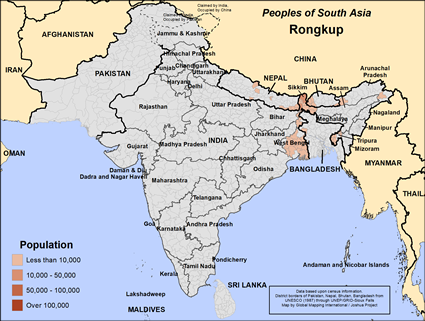The Rongkup are an indigenous people of northeastern India, Bhutan and Nepal. Most of the population lives in India with smaller groups in Bhutan and Nepal. The Rongkup speak the Sino-Tibetan language of Lepcha. Some Indian Rongkup also speak Bengali, which allows them to communicate with outsiders. The Lepcha language has its own script based on Sanskrit. Since the Rongkup are an indigenous people, they are outside the traditional Hindu caste system.
Most Rongkup of India live in the states of Sikkim and West Bengal.
Most Rongkup engage in farming rice, millet, barley, maize, and wheat along with fruit and vegetables. Fish and chicken supplement their diets. They make an alcoholic drink from millet.
Besides farming, the Lepcha also specialize in carpentry, spinning and weaving. There is no division of labor based on sex. A man may spin and a woman may weave, or vice versa. Men and women work side by side in the fields. Rural citizens of Nepal pay little or no taxes. However, they are required to work without pay for local projects.
Village communities and extended families are a part of the culture. The Rongkup generally live in scattered communities. Sometimes they build settlements of two or three houses huddled together in heavily forested areas near their fields. They make their houses of finely woven bamboo strips or wood and have thatched roofs.
The Rongkup are gentle and live peacefully with little crime in their villages. They believe that aggression destroys the community, and elders handle all quarrels.
They have an oral culture. Dances, music on traditional instruments and singing take place on holidays.
The Rongkup marry within their group. Families arrange marriages with the consent of the young people. The local shaman finds an auspicious day for the wedding based on the birthdays of the groom and bride. Due to lack of access to modern medicine, child mortality is high. Couples tend to have a large number of children so some will survive to adulthood.
Most of the Lepcha consider themselves Buddhists. However, they practice two major religious philosophies: Lamaism, derived from Buddhism, and Mun, a folk religion. Though they are contradictory, they practice these beliefs simultaneously. The Mun religion involves a special relationship with a family spirit. They use animal sacrifices and direct communication to appease and ward off evil spirits that may cause disease or disaster.
For Lamaistic Buddhists, offering animal sacrifices is a terrible sin. They found their philosophy on reincarnation (continuous cycle of death and rebirth), and they believe that their works in this life will either reward or punish them in their next life.
There are a sizable number of Christians among the Rongkup of India. It is unknown how many of these believers are evangelicals. The complete Bible in Lepcha became available in 1989.
Many Rongkup do not have access to electricity or modern medicine. Medical teams of believers can help the Rongkup. The Rongkup people would benefit from the installation of solar panels. Christians can start schools so they can read the Rongkup Bible.
The Rongkup people need to hear a clear presentation of the good news of Jesus Christ. He alone can forgive their sins and grant them eternal life. He can free them from their fear of evil spirits.
Ask the Lord to send Christian medical personnel and teachers to share the love of Jesus with the Rongkup in India. Pray that Christian radio broadcasts and evangelical literature will be made available to the Rongkup. Ask the Lord to save key leaders among the Rongkup who will boldly proclaim the gospel. Pray for a strong church planting movement for all Rongkup communities.
Scripture Prayers for the Rongkup-Lepcha in India.
| Profile Source: Joshua Project |














